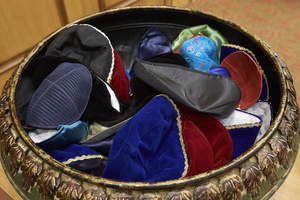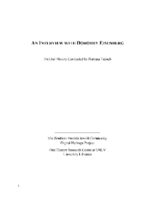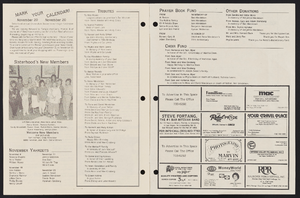Search the Special Collections and Archives Portal
Search Results

Transcript of interview with Dr. Leonard Kreisler by Barbara Tabach, May 23, 2016
Date
Archival Collection
Description
Dr. Leonard Kreisler, MD, was born August 3, 1930 in Brooklyn to post World War I European Jewish immigrants. Raised in the smaller community of White Plains, New York, he worked happily by his father?s side. The elder Kreisler was a cabinet maker and carpenter, who Len describes as fiercely independent. Young Len keenly helped his Yiddish language father write his contracts and guided him to increasing his prices. At an early age, Len knew that he would become a medical doctor?little did he know what an amazing life was in his future. It was while attending the University of Vermont, College of Medicine that Len met his wife Joan. They married in June 1957. Joan became a teacher and later a real estate agent while in Las Vegas. This interview includes stories about his medical education and his thirteen year private medical practice in Peekskill, New York. This was followed by a career in occupational medicine and over seventeen years as the Medical Director at the Nevada Test Site for Reynolds Electric and Engineering Corporation (1973 ? 1990). During that time he was also elected Chief of Staff at University Medical Center (UMC) for two years and helped create the Children?s Miracle Network Telethon and the UMC Foundation. When he recalls moving to Las Vegas, his memories include jogging by Temple Beth Sholom and joining a minyan. He became a congregation vice president. When his career at the Test Site was halted, his medical adventure led him to be a maritime physician for a cruise liner. He also ran twice for Clark County Commissioner against Thalia Dondero. Dr. Kreisler is the author of several books: Death by Any Means (2005); Roll the Dice, Pick a Doc and Hope for the Best (2009); The Codes of Babylon (2010); Shortfall (2011); The Obligated Volunteer (2014) and In Bed Alone, A Caregiver?s Odyssey (2016).
Text

Transcript from interview with Mike Unger by Barbara Tabach, January 21, 2016
Date
Archival Collection
Description
In this interview, Unger reflects upon his long and successful career in hotel management in Las Vegas and also in Arizona and Pennsylvania. He shares stories as a local celebrity, particularly in the 1970s and 1980s when he worked at Caesars Palace, as well as the big projects he oversaw, including organizing the first big fight nights, World Series of Tavern Poker and Grand Prix race. He talks about working with Morris Shenker, Moe Dalitz, Cliff Perlman and Billy Weinberger, and the role of the Jewish community in the city, and specifically in the gaming industry. Unger also discusses his non-gaming industry ventures which have included a satellite communications business and a bagel business.
Mike Unger was born in Queens, New York in 1947, and spent most of his childhood in Long Island, growing up in a predominantly Jewish and Italian community. As a young adult, Unger was already working hard, running one of his family?s restaurant after school. When he was in high school, his family moved to Los Angeles to accommodate his father?s health needs, and eventually end up in Las Vegas by 1967. Over the next two decades, Unger would work at nine properties in the city. Unger is one of the University of Nevada, Las Vegas? first hotel management graduates, and started his career with Summa Corporation in its management training program at the Frontier Hotel and Casino. After a brief stint at the Airport Marina Hotel in Los Angeles in 1972, Unger returned to Las Vegas, serving in management capacities at the Aladdin Hotel and Casino, Summa Corporation headquarters and Landmark Hotel and Casino. In 1978, he joined Caesars Palace Hotel and Casino management team, and was integral in creating the city?s first large boxing events, the World Series of Tavern Pool, and the Grand Prix race. Unger also ran properties for the White Mountain Apache and Colorado River Indian Tribes in Arizona, as well as the Showboat Hotel and Casino. In this interview, Unger reflects upon his long and successful career in hotel management in Las Vegas and also in Arizona and Pennsylvania. He shares stories as a local celebrity, particularly in the 1970s and 1980s when he worked at Caesars Palace, as well as the big projects he oversaw, including organizing the first big fight nights, World Series of Tavern Poker and Grand Prix race. He talks about working with Morris Shenker, Moe Dalitz, Cliff Perlman and Billy Weinberger, and the role of the Jewish community in the city, and specifically in the gaming industry. Unger also discusses his non-gaming industry ventures which have included a satellite communications business and a bagel business.
Text

Photograph of yarmukles in Congregation Ner Tamid's Polis Lobby, Henderson, Nevada, May 24, 2016
Date
Archival Collection
Description
A collection of yarmulkes await usage in the Polis Lobby of Congregation Ner Tamid on the Greenspun Campus for Jewish Life, Learning & Spiritual Renewal.
Image

Transcript from interview with Rabbi Yocheved Mintz by Barbara Tabach, March 11, 2015
Date
Archival Collection
Description
During this oral history, Rabbi Yocheved Mintz weaves the journey of her life before and during her move to Las Vegas. She recalls thinking the "whole world was Jewish" growing up in Cleveland, Ohio, and discusses finding a community in Las Vegas, and becoming a rabbi in 2004.
Yocheved (nee Porath) Mintz is a native of Cleveland, Ohio, where she grew up surrounded by Jewish tradition and teachings. Her grandfather was Rabbi Israel Porath and inspiration to become the family?s first female rabbi. She was ordained in May 2004. The next year she became the second spiritual leader of Valley Outreach Synagogue, now known as P?nai Tikvah. She soon was known as a tireless and inspirational rabbi for the entire Jewish community of Las Vegas. After eleven years, on June 17-18, 2016, Rabbi Mintz?s life and dedication to being Jewish were celebrated. She transitioned to be Rabbi Emerita/Senior Educator. Before moving from Chicago to Las Vegas in 1999 she was abundantly busy with raising four sons she had with her husband the late Dr. Alan Mintz (1938-2007). However, she also managed to pursue her education, become an interior designer, and co-found with her friend Etty Dolgin, a Jewish education consulting firm called Kesher Team. Yet there was a lingering goal to become a rabbi. Throughout her life, Yocheved eagerly studied various approaches to living a Jewish life. So once she had settled into Las Vegas, she began her commute to Los Angeles to study at the Academy for Jewish Religion, a trans-denominational seminary. She interned at Temple Beth Sholom and has been involved in Jewish education locally and nationally. She has served as the first president of the Las Vegas Board of Rabbis and on the Interfaith Council of Southern Nevada.
Text

Transcript of interview with Dayvid Figler by Barbara Tabach, June 22, 2016
Date
Archival Collection
Description
Dayvid Figler (1967 - ) is the quiet boy who became an insightful and creative contributor to the local culture of Las Vegas. The oldest of Barbara and Meyer Figler?s three children, he was four years old when the family station wagon reached Las Vegas in 1971. They moved in with Uncle Izzy (aka Big Irish) Figler for a few months. Having the ?juice,? Dayvid?s father soon became a Pan dealer on the Strip. As the family grew, Barbara eventually immersed her energies in her children?s activities, Hadassah and Temple Beth Sholom. In this oral history, Dayvid also recalls his awkward, but incredibly interesting youth, his bar mitzvah at Temple Beth Sholom, and path to a successful career as a criminal defense attorney. He also talks about embracing Las Vegas as his home, owning a home in John S. Park neighborhood and mentions a number of literary depictions of Las Vegas that he admires. Dayvid describes growing up a ?casino kid? who lived in an apartment near the Riviera Hotel. This, in addition to his slight stature and academic brilliance, may have set him apart from many of his childhood peers. He graduated from Valley High School at the age of 16 and by the age of 23 he was a rising star in the legal world. He looks back with appreciation to his list of mentors who encouraged him along the way. Dayvid is also a local favorite as an essayist and poet. For a number of years he could be heard on KNPR/NPR. He has been a performer in hundreds of productions that featured his comic wit and writings, from Lollapalooza to Tom and Jerry?s on Maryland Parkway.
Text

Transcript of interview with Dorothy Eisenberg by Barbara Tabach, October 23, 2014
Date
Archival Collection
Description
Interview with Dorothy Eisenberg by Barbara Tabach on October 23, 2014. In this interview, Eisenberg discusses her upbringing on the east coast and becoming a widow with four children. She met her second husband at a synagogue, and they moved to Las Vegas for a fresh start. Eisenberg became involved with Temple Beth Sholom, and the Las Vegas League of Women Voters. She has a school named after her in the Clark County School District.
Dorothy Eisenberg is a first generation American, with roots in Ukraine and Central Europe, and grew up in Philadelphia. Judaism was a significant part of Dorothy's life from the beginning, and both her and her brother spent many of their afternoons at Hebrew school and most weekends at Shabbat services as adolescents. Eisenberg moved to Las Vegas with her children and second husband in 1964. She became an influential member of the community and served as the Jewish Federation of Las Vegas's first female president. She was also actively involved in the League of Women Voters of Las Vegas Valley, including leading the organization's advocacy for school desegregation and serving as its president for two years.
Text

Transcript of interview with Greg Goussak by Barbara Tabach, May 19, 2015
Date
Archival Collection
Description
Interview with Greg Goussak by Barbara Tabach on May 19, 2015. In this interview Goussak discusses his upbringing in Las Vegas, including his education in the Clark County School District and his experience with bussing to Sixth Grade Centers as the school district attempted to desegregate. As a teenager, he became involved with the B'nai B'rith Youth Organization through Temple Beth Sholom. Goussak talks about his mother's involvement with the Albert Einstein Hebrew Day School, which later moved and became the Dr. Miriam and Sheldon Adelson Educational Campus, and the kidnapping of Cary Sayegh. He then discusses finding his niche in accounting through taking an accounting course at UNLV as a high school student. Goussak talks about his education, career path as a controller in the gaming industry and public works projects, and becoming a professor.
Greg Goussak is a Las Vegas native, born January 1961, just after his parents moved to the city for his father's work as an accountant. His mother was a dedicated educator, who served throughout the city as a teacher and principal, including as the director of the Hebrew Day School in the 1970s. Greg's childhood was shaped by experiences with Las Vegas' sixth grade centers, challenges with scoliosis, and especially, involvement with B'nai B'rith Youth Organization (BBYO). In 1974, Greg helped start the city's new Aleph Zadik Aleph (AZA) chapter for BBYO, and his involvement with this youth organization became a formative part of his junior high and high school years. During this time, he became very involved with AZA at the regional, district and national levels, and made lifelong friends. As a high school student, Greg participated in UNLV's Early Studies Program, earning him college credit, and there he discovered his aptitude for accounting. He began tutoring fellow high school students in accounting, and thus, simultaneously discovered his passion for teaching. After earning his bachelor's degree in hospitality administration from UNLV in 1984, Greg got a job at Dunes Hotel and Casino, then under the leadership of Moe Shenker, working as an operations analyst. Over the next decade, Greg worked as a controller at several properties around town, including Nevada Palace, the Four Queens, Fitzgeralds, as well as a project on Boulder Highway. In 1992, seeking a reprieve from the gaming industry, Greg went back to UNLV to achieve his master's degree, in hotel administration. After graduating, he worked for Riviera Hotel and Casino, and established and oversaw their auditing department as well as box office. During this time, Greg met his wife Cynthia (Cindy) Riceberg, and the two were married in 1996. That same year, Greg took a position with Sigma Game, and soon after became Chief Financial Officer for Manpower Temporary Staffing. In 2002, deciding it was time to work for himself, he bought Haynes and Thomas Printers, which he owned and operated for the next eight years. Greg started teaching in 1989 as an adjunct professor in the William F. Harrah College of Hotel Administration at UNLV. In 2010, having finished his doctorate the year before, Greg assumed his first fulltime faculty position as an assistant professor at the University of Southern Nevada. The next year he was hired as an assistant professor at Ashford University, where he continues to teach today in the Forbes School of Business. Greg and Cindy have two daughters: Ariel, who is seventeen years old, and Alyssa, who is fourteen years old.
Text

Transcript of interview with Gilbert Shaw by Barbara Tabach, May 3, 2016
Date
Archival Collection
Description
In this interview, Gil Shaw recalls milestones at Congregation Ner Tamid?first bat mitzvah?and anecdotes about leaders, first rabbis, donation by Moe Dalitz, services being held in Protestant churches, and even a controversy over colors for the new temple building of Ner Tamid.
Text

Newsletter from Congregation Ner Tamid (Las Vegas, Nev.), November 1988
Date
Archival Collection
Description
Congregation Ner Tamid's bulletin for November 1988. The bulletin contains pictures, notes, and news.
Mixed Content

Transcript of interview with Arlene Blut by Barbara Tabach, May 28, 2015
Date
Archival Collection
Description
In this interview, Arlene discusses her family and important friendships; her relations with and impressions of the disparate Las Vegas Jewish communities; the meaningful ways her Jewish relationships in Duluth, Winnipeg, and Las Vegas intertwine; her theatrical, professional, and philanthropic work; the reasons she and Jerry became active Zionists; and their support for Israeli causes. Her liberal sprinkling of Yiddish terms enriches her speech as it exemplifies her deep cultural attachment to and identification with her Jewish heritage, despite the fact that her wide and diverse circle of friends remains predominantly non-Jewish.
Actor, director, friend, mother, producer, wife, and volunteer extraordinaire Arlene Piekoff (now Blut) arrived in Las Vegas in 1971 with two young children and husband, Michael Peikoff, who was opening a surgical practice. Arlene was born and raised in Duluth, Minnesota, where she attended a Conservative Jewish temple but had mostly non-Jewish friends. She met Michael at the University of Minnesota, and they married before he began medical school in Winnipeg, Manitoba, Canada. Arlene and Michael followed his residencies and fellowships to California, Michigan, and Manitoba before they came to Las Vegas Through her brother in law and Ayn Rand?s intellectual heir, Leonard Peikoff, Arlene was exposed to Ayn Rand Objectivism, a philosophy that still influences her political outlook. After her 1975 divorce she began working at the Jockey Club; founded the Meadows Playhouse, Las Vegas?s first professional black box theater; and started Renta Yenta, the valley?s first full-service event planning business. In 1980 she married tax attorney Jerry Blut in a Renta-Yenta-produced, Fiddler-on-the-Roof-themed wedding at Paul Anka's Jubilation Restaurant.
Text
